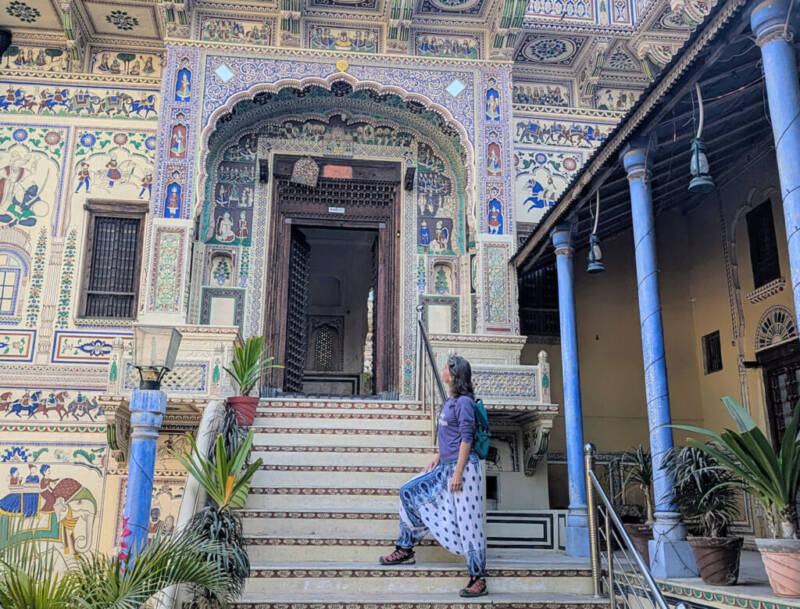Shekhawati, a hidden gem in Rajasthan, enchants visitors with its colorful havelis adorned with magnificent frescoes that tell stories from bygone eras. But don’t be mistaken – it’s not just the buildings that shine; the people, dressed in traditional, brightly colored clothing, make this region vibrant and authentic. Here, where mass tourism hasn’t yet struck, you’ll find clean streets and a pure, hospitable atmosphere.
With a guide, I discovered the charming villages in the area over several days, each with its own unique character and hidden treasures.
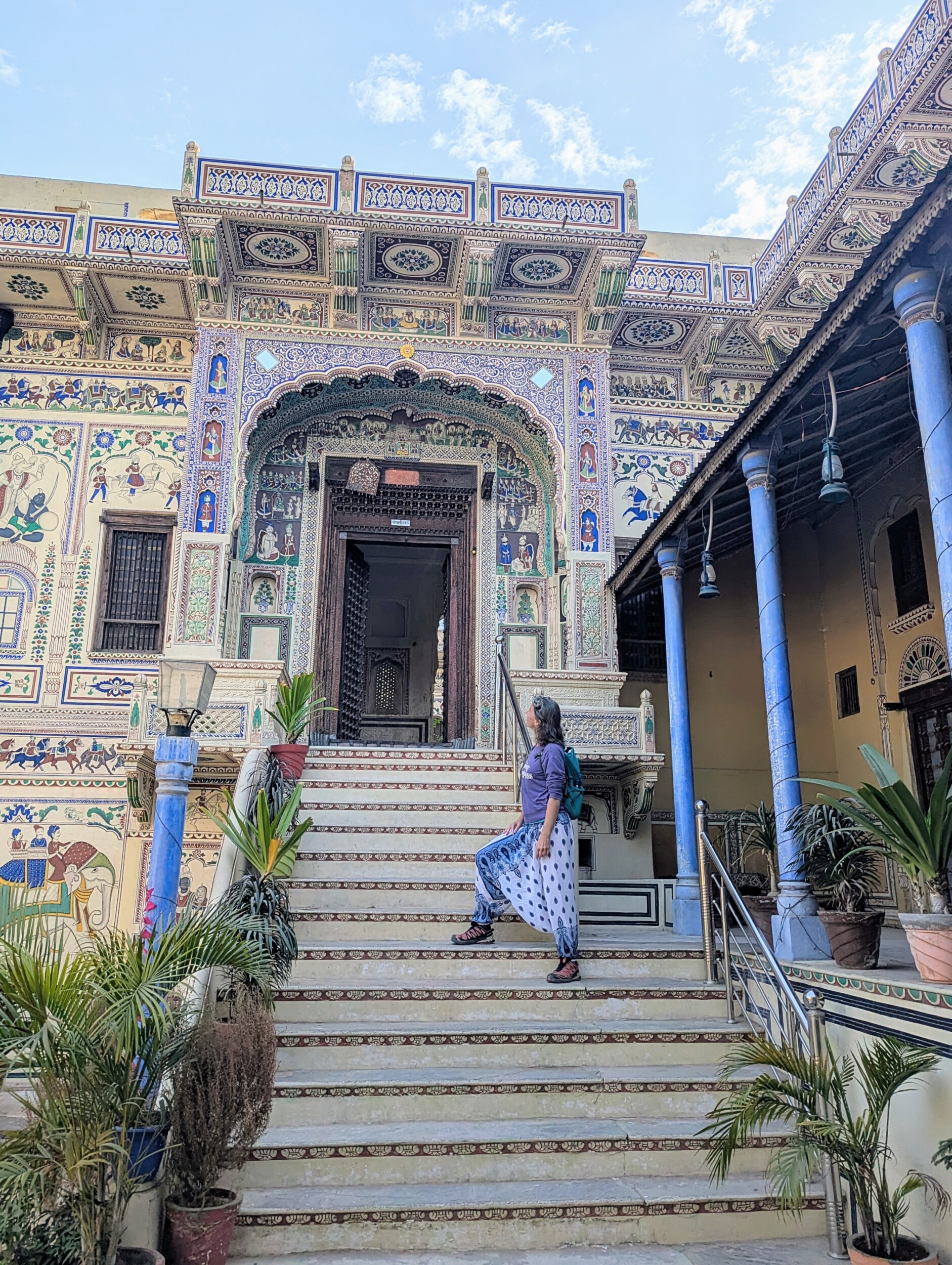
What is the Shekhawati Region Famous For?
The Shekhawati region is located in northern India, in the Thar Desert in the state of Rajasthan. You’ll find the districts of Sikar, Jhunjhunu, and Churu, among others. The region is famous for its many beautifully painted havelis. Completely painted on the inside, but even more uniquely, the exterior is often entirely painted as well. You can imagine the streetscape.
It’s as if you’re walking through an open-air museum in the Shekhawati region. It quickly becomes clear why Shekhawati is called an open art gallery.
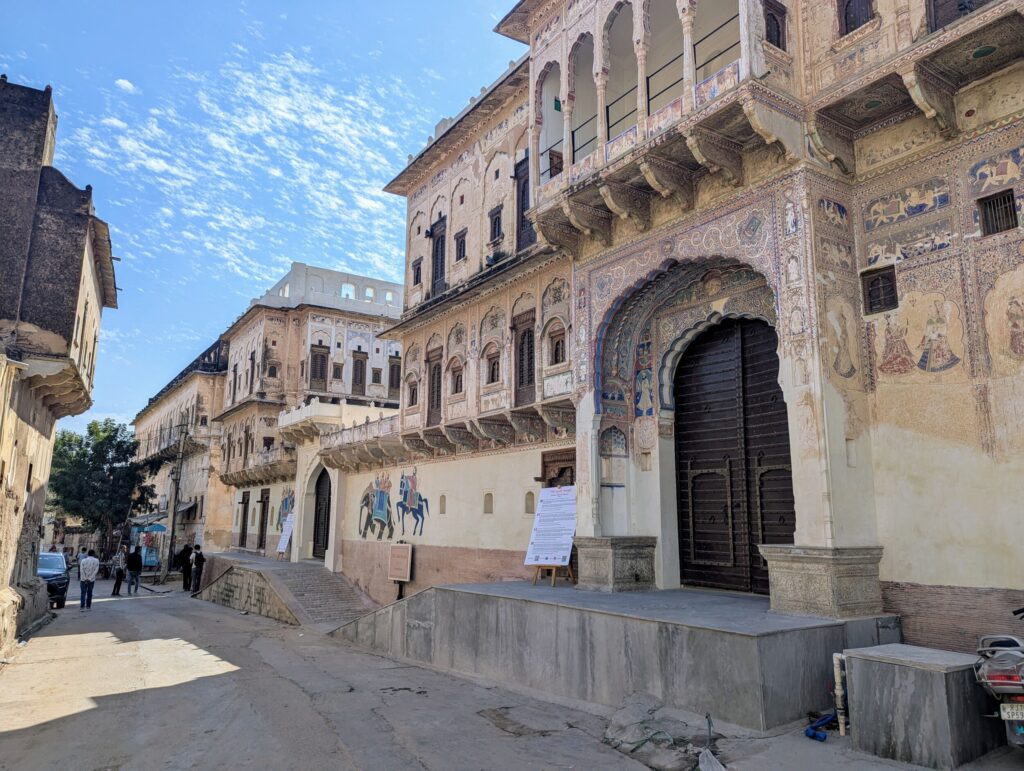
The Open-Air Museum of Shekhawati
Many of these magnificent havelis contain frescoes. How did frescoes come to India, you might wonder? I’ll explain that.
The Marwari and Their Frescoes in Shekhawati
In the 18th and 19th centuries, there were many Marwari traders in the Shekhawati region. They initially dominated mainly the opium trade and brought great wealth to the Shekhawati region. There was an expression: “Pahale shah, phir badshah” — First the merchant, then the emperor. This shows how important the merchants (the Marwari) were considered at that time.
The Rajputana kings and feudal lords preferred to attract as many Marwari as possible to the Shekhawati region because the Marwari brought them significant tax revenues. This initial wealth had connections with the Silk Route, as Rajasthan lies halfway under this important trade route. When the British East India Company made its entrance, the way of trading changed for the Marwari.
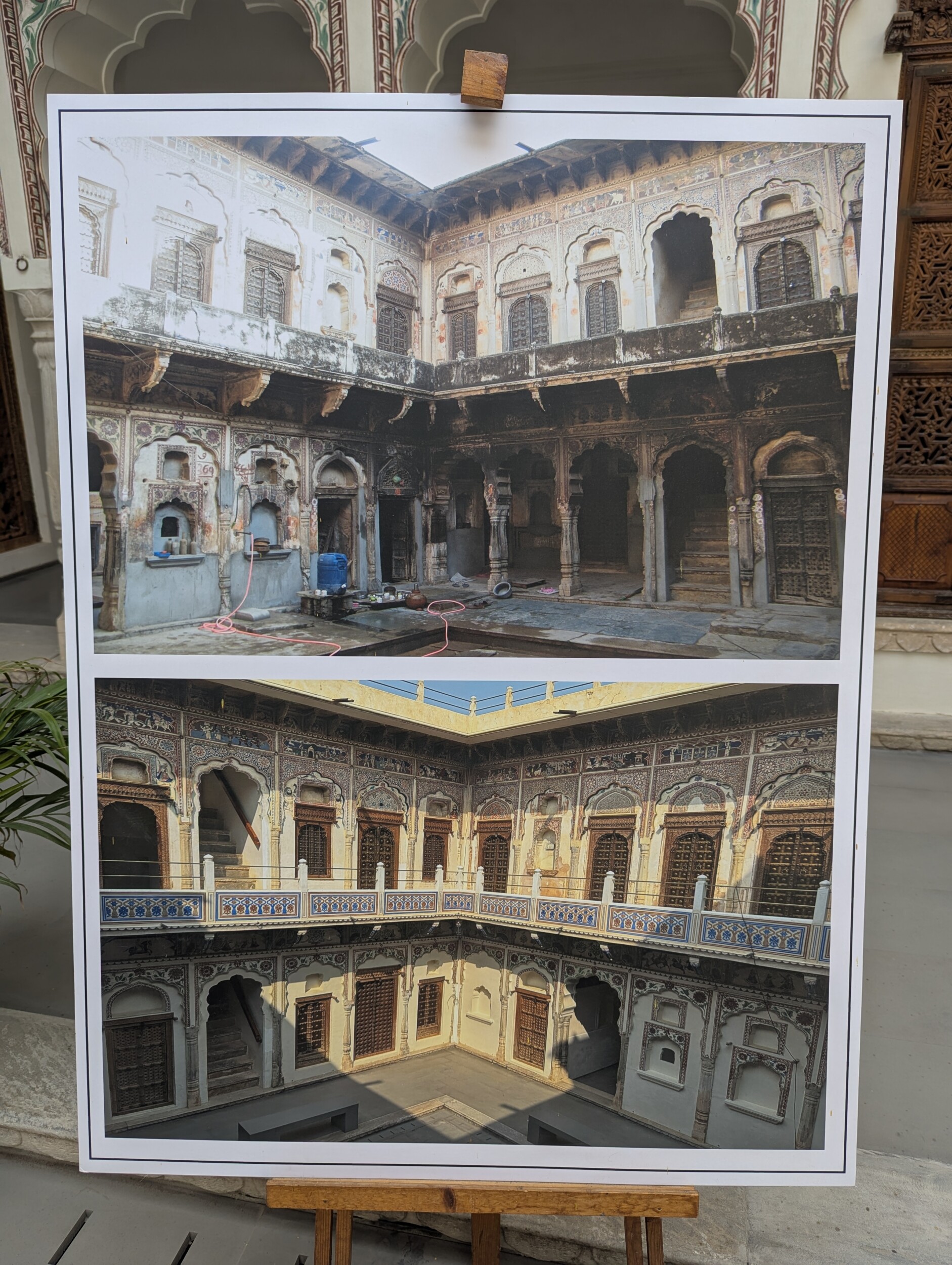
After the British came, they moved toward the great sea and engaged in cotton and jute trade, and later opened banks and began providing loans.
So how did those frescoes come to Shekhawati? Many Marwari also made trips to Europe through trade and thus to Italy, where they saw the art of frescoes. In some havelis, you can also see European influences in the paintings. The kumhars, a caste that works with clay, also called chiteras or chejaras, mastered the art of painting and building havelis. They used natural dyes such as indigo, kajal, geru (red stone), and kesar (saffron).
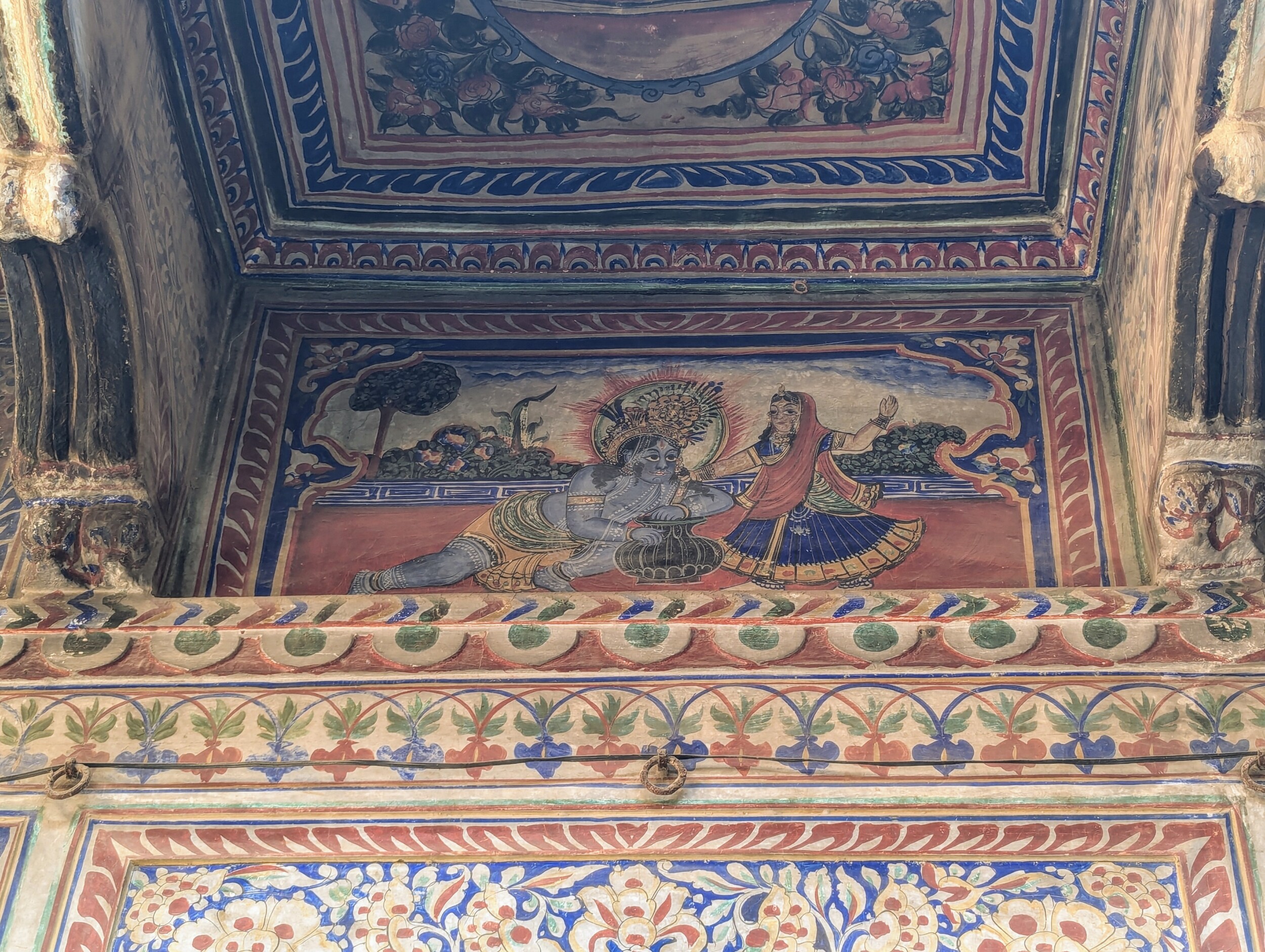
To properly display their wealth, they had paintings made on the entire haveli with the most magnificent paintings and frescoes. Many of them can still be admired today. We have this luck due to the drought of the Thar Desert.
How to Best Visit the Shekhawati Region
Taking a central place in the Shekhawati region is convenient. From there, you can plan a day trip with a local guide. If you have more time, you can even plan multiple day trips – there’s plenty to see in the Shekhawati region. It’s also advisable not to hop from haveli to haveli all day because at some point they all start to look alike. The havelis may be truly magnificent, but after visiting the 10th one, you won’t really notice the difference anymore.
Which Places Are a Must-Visit?
You can choose different routes to visit various places. The places Mandawa, Nawalgarh, Dundlod, Fatehpur Shekhawati, Ramgarh, Mahansar, Churu, and Jhunjhunu are really worth adding to your route if possible. I didn’t have time to visit them all. There are also Sikar, Mukundgarh, Biassau, and Laxmangarh.
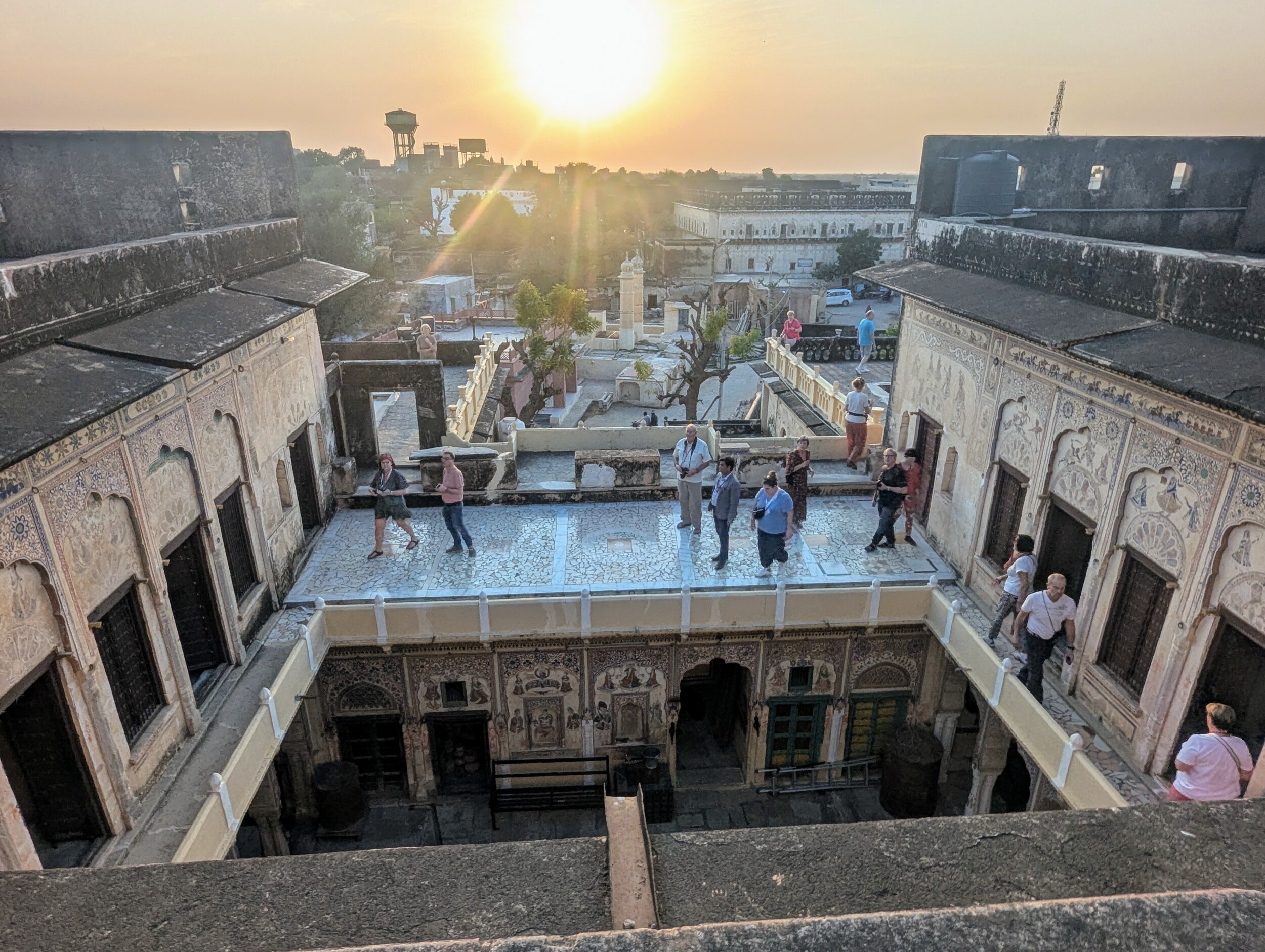
What is a Haveli?
Havelis are large merchant houses like we see in Hanseatic cities; in East Asia, they call these houses havelis. Large merchant houses from a prosperous time. Many traders made a detour from the Silk Route and stayed for several days in one of the havelis. Many Marwari also traveled to the Silk Route to trade in various goods.
A haveli is built from several parts. At the road, you often see a magnificent entrance, a Mukhya Dwar, large entrance. This is large enough to let horses through. In that large door, there’s also a small door called Toran Darwaza. This can be used when the large door is closed in the evening to still go inside.
First Courtyard – Haveli
After entering through the Mukhya Dwar, you come to a courtyard. This is meant for traders and visitors. From this first courtyard, you can’t yet look further inside. On the sides of the courtyard, you’ll find all kinds of spaces for traders and their administration.
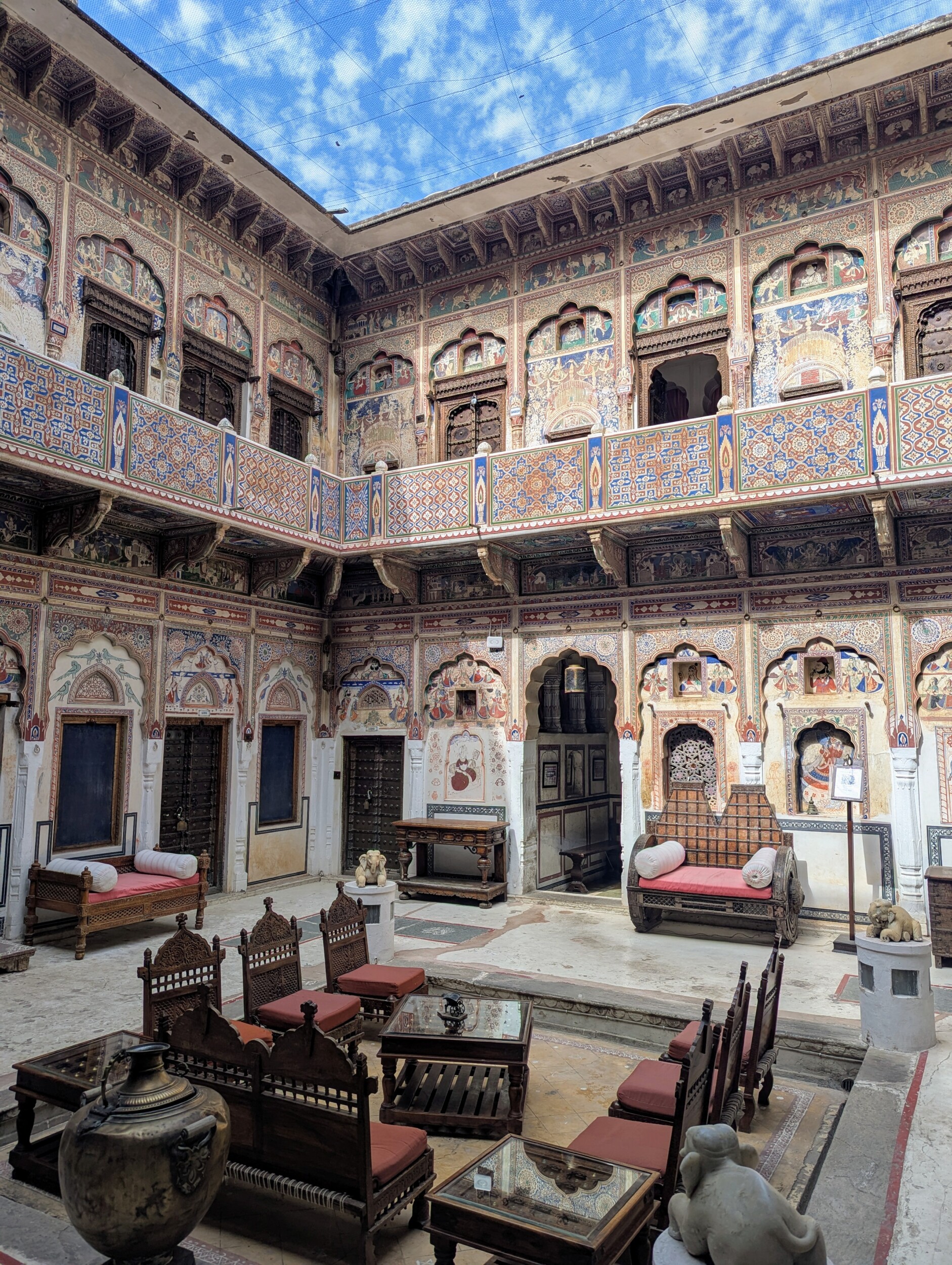
Second Courtyard – Haveli
If after your arrival you’re admitted to come inside, the women who are in the second courtyard have had time to make themselves presentable. This second courtyard is called Zenana. This is where daily life takes place and where the family lives. Around this courtyard are the rooms for sleeping, working, but also the kitchen and storage.
Third Courtyard – Haveli
Some havelis have a third courtyard, called Nohra. This is meant for animals, horses, or livestock that are kept. You must remember that to this day, large wildlife lives in this environment. Years ago, I saw a tiger in Rajasthan, so in earlier times, people had to defend themselves well against this.
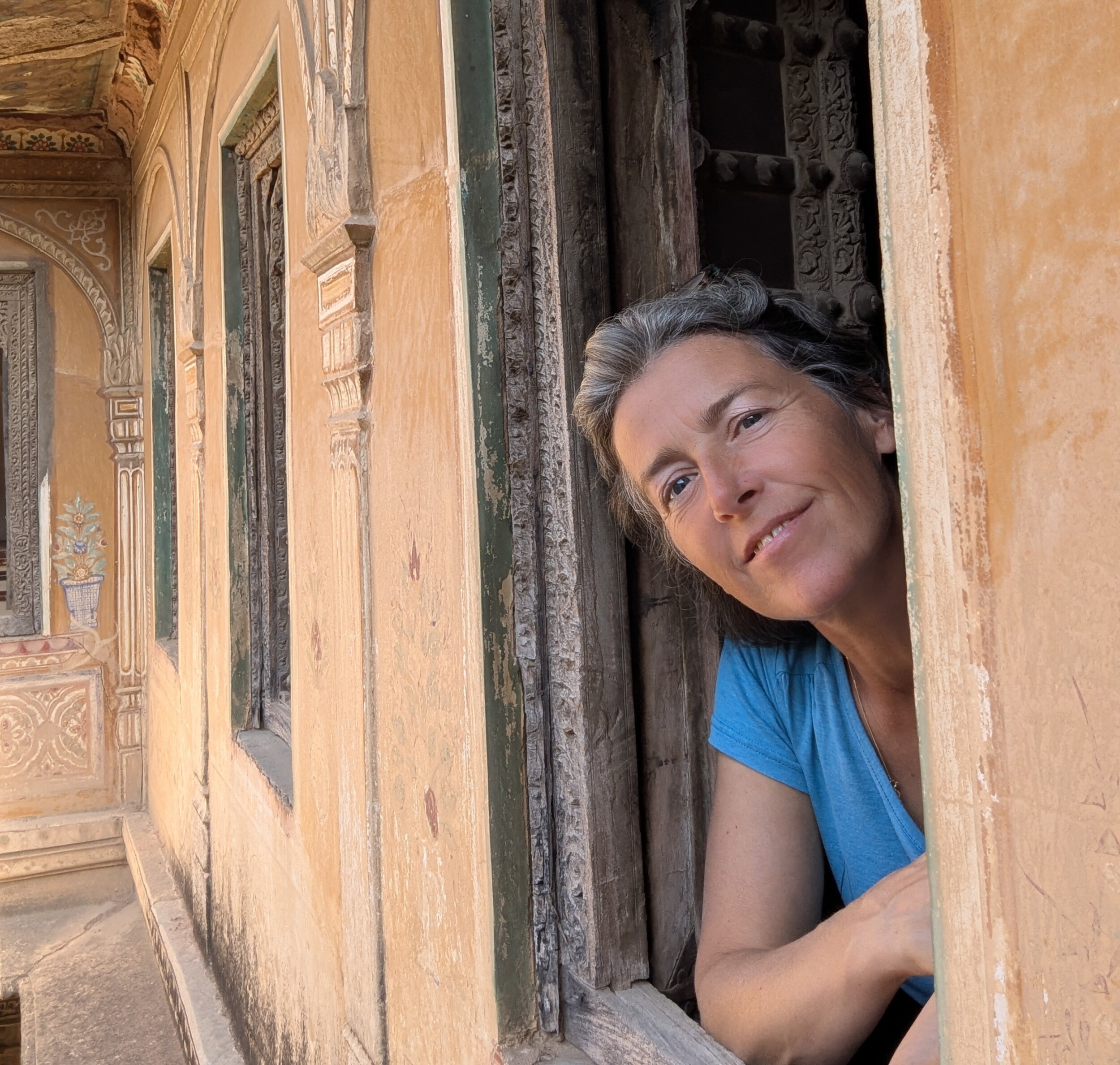
And then all havelis have terraces on the roof. Some are actually used and are beautifully made, but often it’s just a flat roof. The only thing they were used for is that there’s an additional elevation from which one can get a better view over the surroundings. Purely strategic added value.
The Frescoes of Shekhawati
What is actually a fresco? Fresco is a painting technique where water-thin paint is applied to wet lime plaster. These wall paintings then often have a matte appearance without gloss. Gold in frescoes is often used to emphasize the divine in a painting.
What meaning do the paintings on the havelis in Shekhawati have, you wonder? Most people in Rajasthan were illiterate at that time, and the paintings on the exterior of a haveli were there to introduce people to the world in the broadest sense of the word.
I saw 3 different themes in the many havelis I visited. There are many religiously descriptive images. These show Gods and Goddesses and tell religious stories.
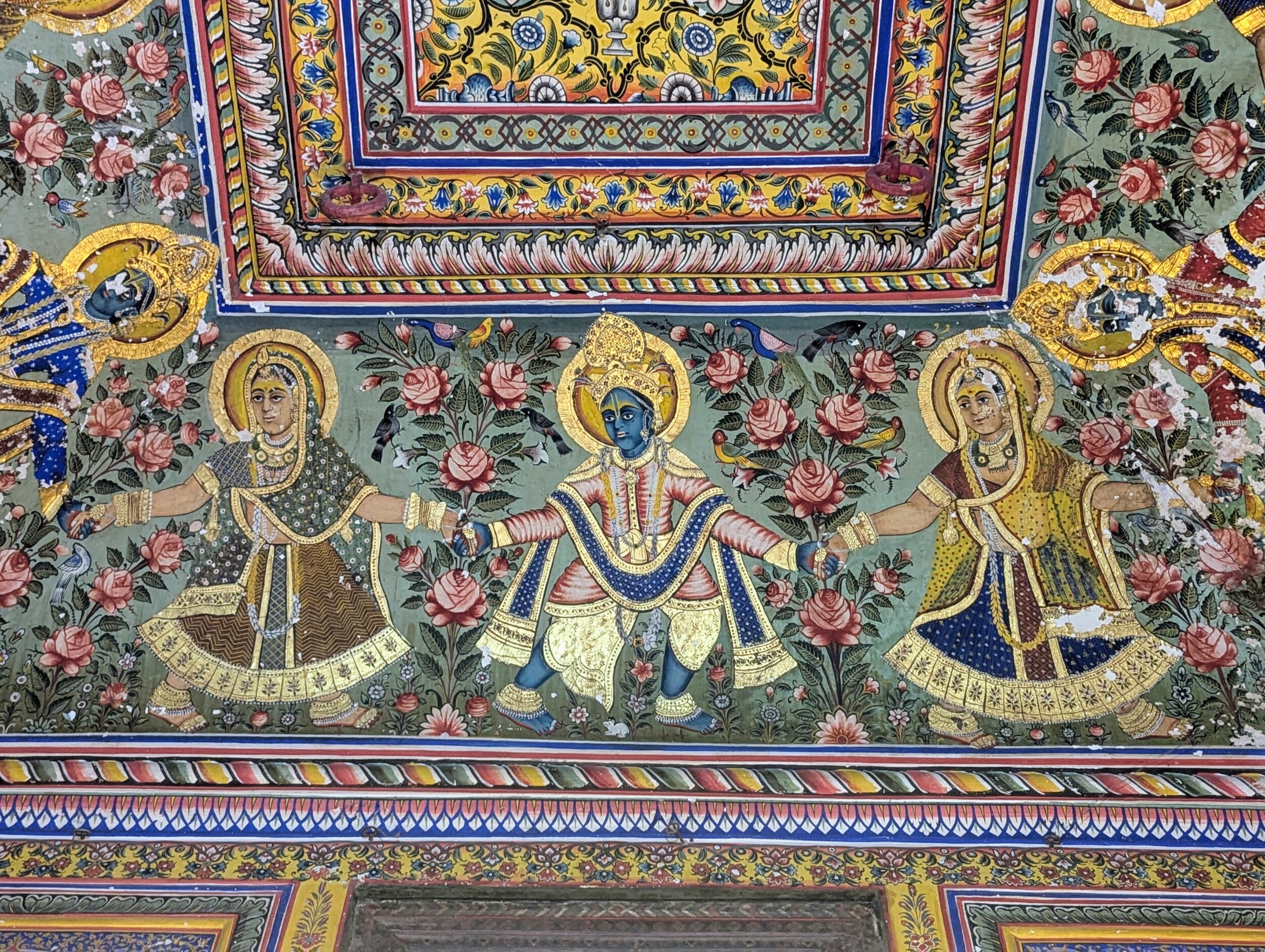
In addition, I saw many portraits of historically important figures. Including the resident or owner himself of the haveli.
There were also many decorative paintings. These give a beautiful picture of the time, where you go from horse and cart to the train that I saw passing by on a single haveli.
How Many Days in Shekhawati?
I spent ‘only’ 3 full days in the Shekhawati region and therefore didn’t see everything there is to see yet. I had ‘seen’ it after those days because: It all starts to look the same at some point. If you stay longer, a rest day from havelis and frescoes is recommended.
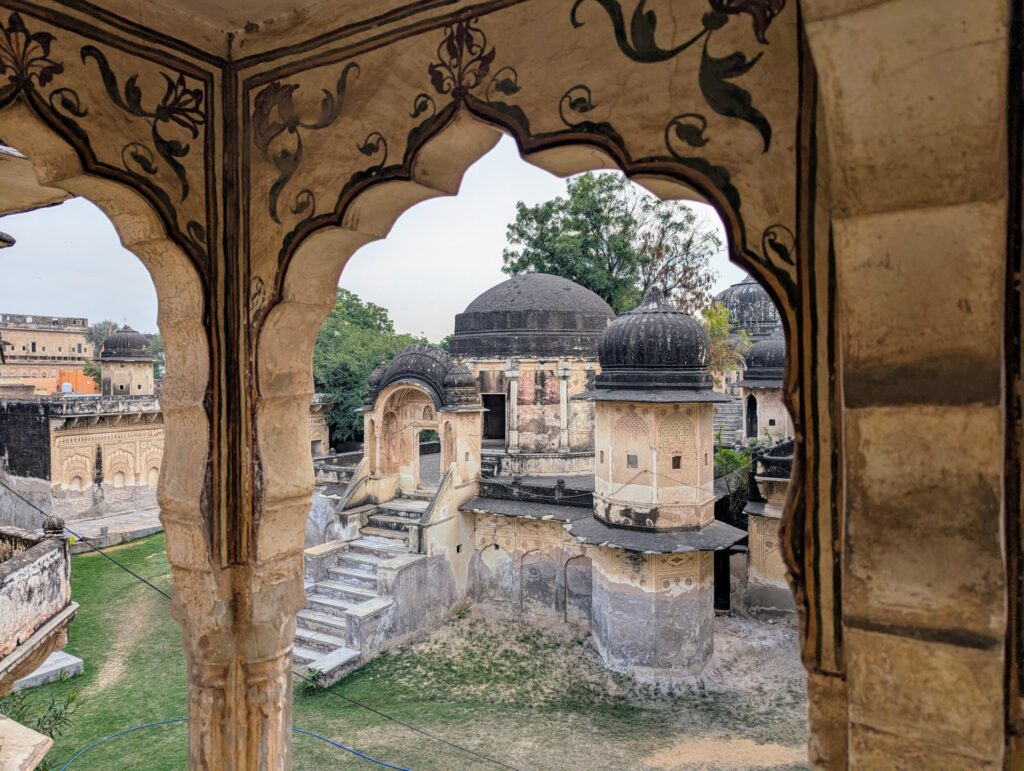
Plan Your Route – Shekhawati Visit
There are different routes recommended to get everything out of your Shekhawati visit. If you only have 1 day during your round trip through Rajasthan to spend, then planning a route is the way to still see a lot and visit the most beautiful havelis.
Routes from Mandawa
Route 1: Mandawa → Fatehpur Shekhawati, 47 km → Ramgarh Shekhawati, 26 km → Mahansar, 9 km → Mandawa 25 km
I largely followed this route from Mandawa.
Route 2: Mandawa → Mukundgarh, 13 km → Dundlod, 9 km → Nawalgarh, 7 km → Mandawa 30 km
Book a hotel in Mandāwa? Hotel Mandāwa Haveli is where I stayed during my stay. Dp you want a swimmingpool? Book Mandawa Kothi
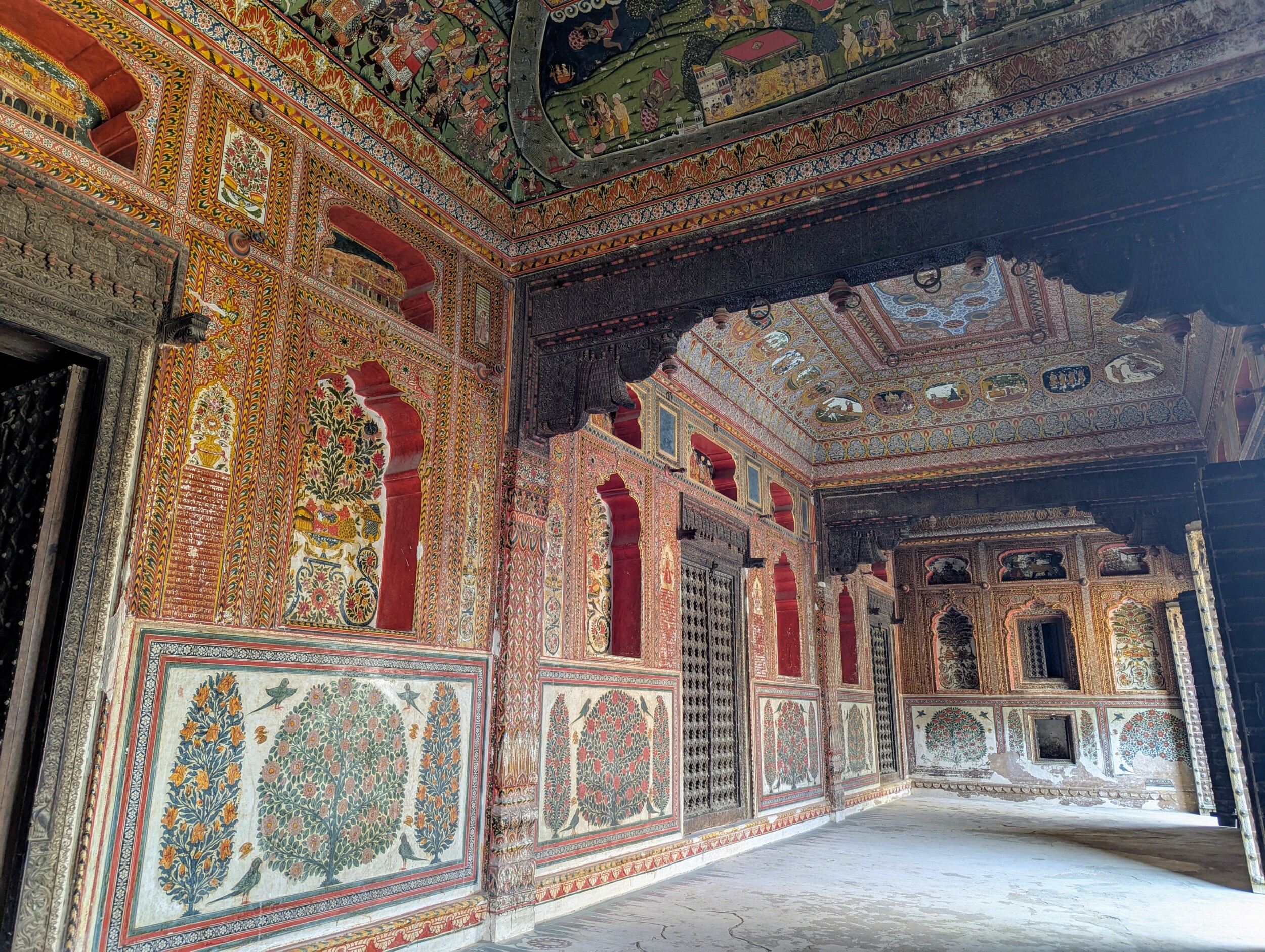
Route from Nawalgarh
Nawalgarh → Sikar, 21 km → Laxmangarh, 28 km → Dundlod, 26 km → Nawalgarh, 9 km
Sikar is a bit lower than Mandawa, so you have completely different places easily within reach in the Shekhawati region. I stayed two nights in Nawalgarh and wanted to spend those walking through the city. I really enjoyed that and would do it again. This meant I didn’t visit the places mentioned in this route.
Book a hotel in Nawalgarh? I stayed at homestay Tourist Pension. Also Apani Dhani Eco-Lodge is a good option.
Route from Churu
Churu → Bissau, 16 km → Mahansar, 7 km → Ramgarh Shekhawati, 9 km → Churu 38 km
From Churu, which is more northern, you come to places that you also encountered on route 1. Because Churu is a very small place with few dining options, this option to stay overnight is less popular. It could be a consideration to stay here precisely.
Book a hotel in Churu? It’s only a small village with limited choices. I can recommend Malji Ka Kamra which is located in a beautiful haveli.
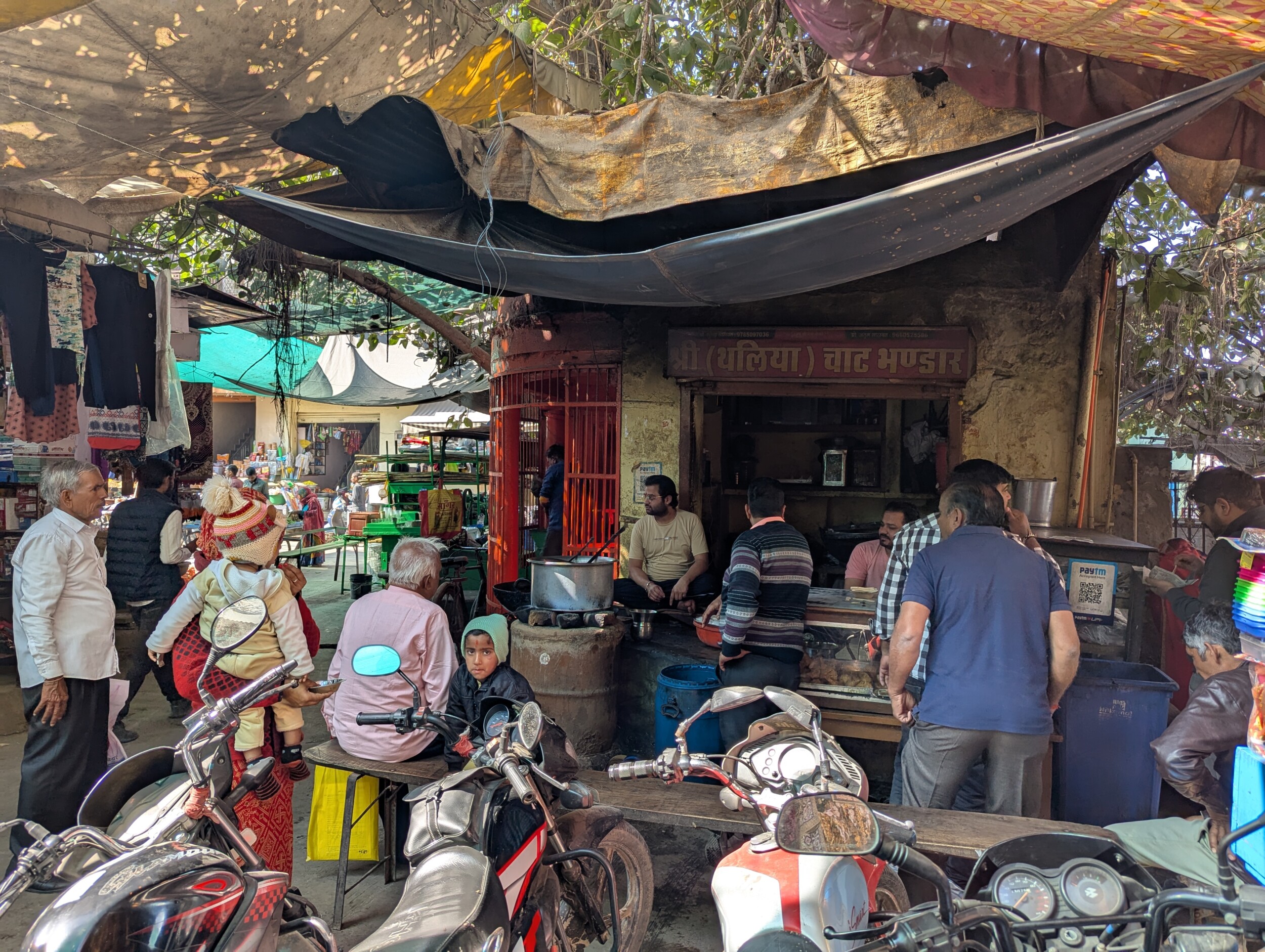
Best Time to Visit Shekhawati
October to February
The best time to visit Shekhawati is from October to February. You’re in the winter period then, and it’s not so hot. In the evening, it can still cool down quite a bit, and during the day it can be quite warm by our standards. A jacket in the evening is recommended, and protecting yourself well against the bright sun in the afternoon.
Choose Your Accommodation in the Shekhawati Region
Not every place in the Shekhawati region has a wide assortment of hotels. Additionally, in some places, there aren’t many options for lunch or dinner. Keep this in mind when making your choice.
This is why I visited the Shekhawati region from Mandawa and Nawalgarh. In Mandawa and Nawalgarh, there are sufficient dining options, and as a tourist, you can find most of what you need.
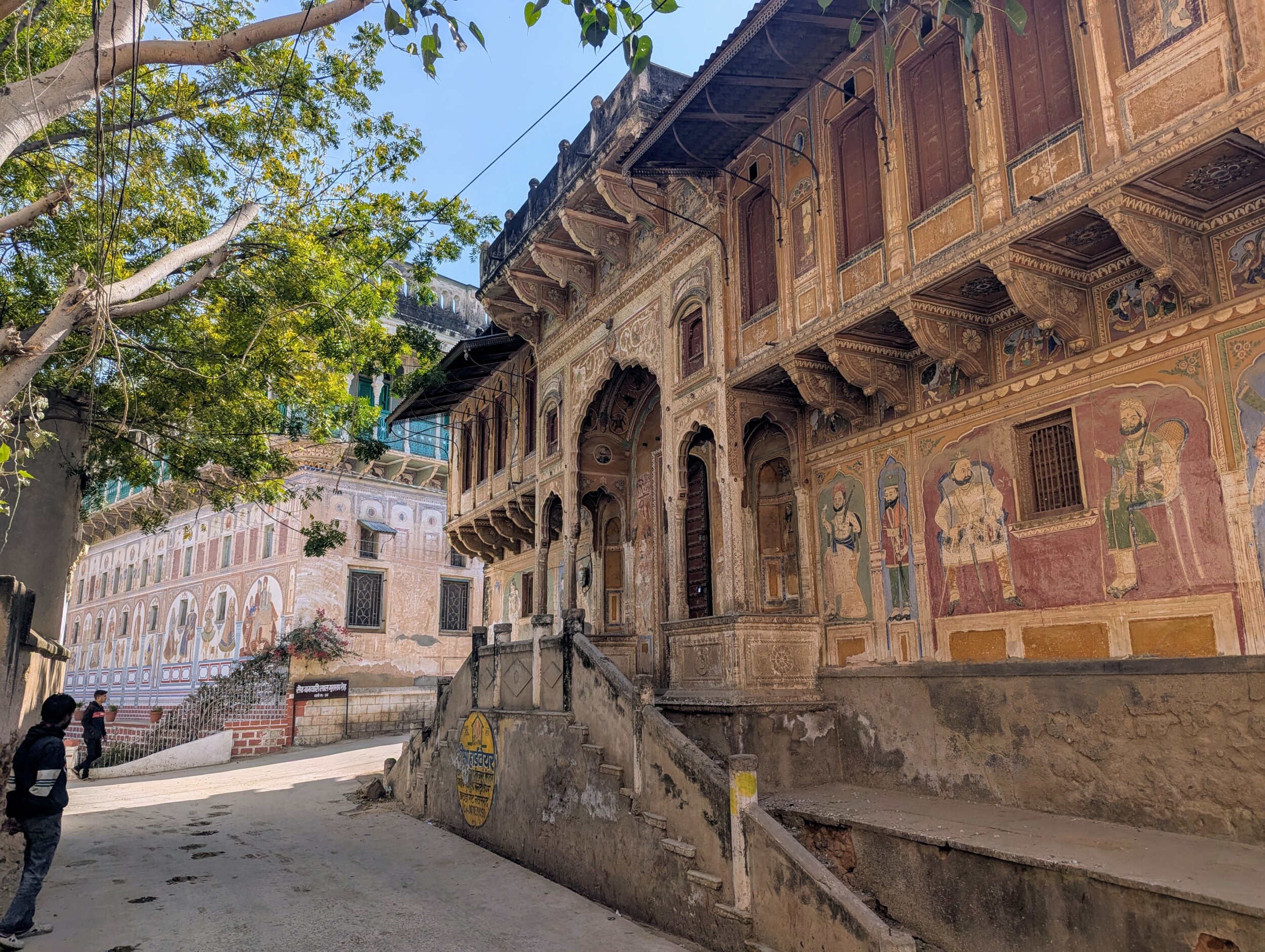
In Mandawa, after a day or 2, you’re done – you’ve seen the highlights, and people start recognizing you 🙂 The same goes for Nawalgarh. This is also because it’s not very touristy yet, and as a white tourist, you stand out quite a bit in the streets of the Shekhawati region.
Where to Stay in Mandawa
Hotel Mandawa Haveli – Luxury & Heritage Hotel
I stayed 2 nights in Mandawa right next to the Sonthaliya Gate on the main street. There I had booked a beautiful haveli right in the center of Mandawa. It was one of the cheaper options, and unfortunately, I could see that a bit in the maintenance (Feb 2025). Apart from that, I was very happy with the hotel and the location.
My room was beautiful, although sometimes some pieces of plaster or paint fell from the ceiling. The bathroom was also nice with a warm shower. The breakfast was good and extensive in a beautiful room that overlooked the first courtyard of this haveli.
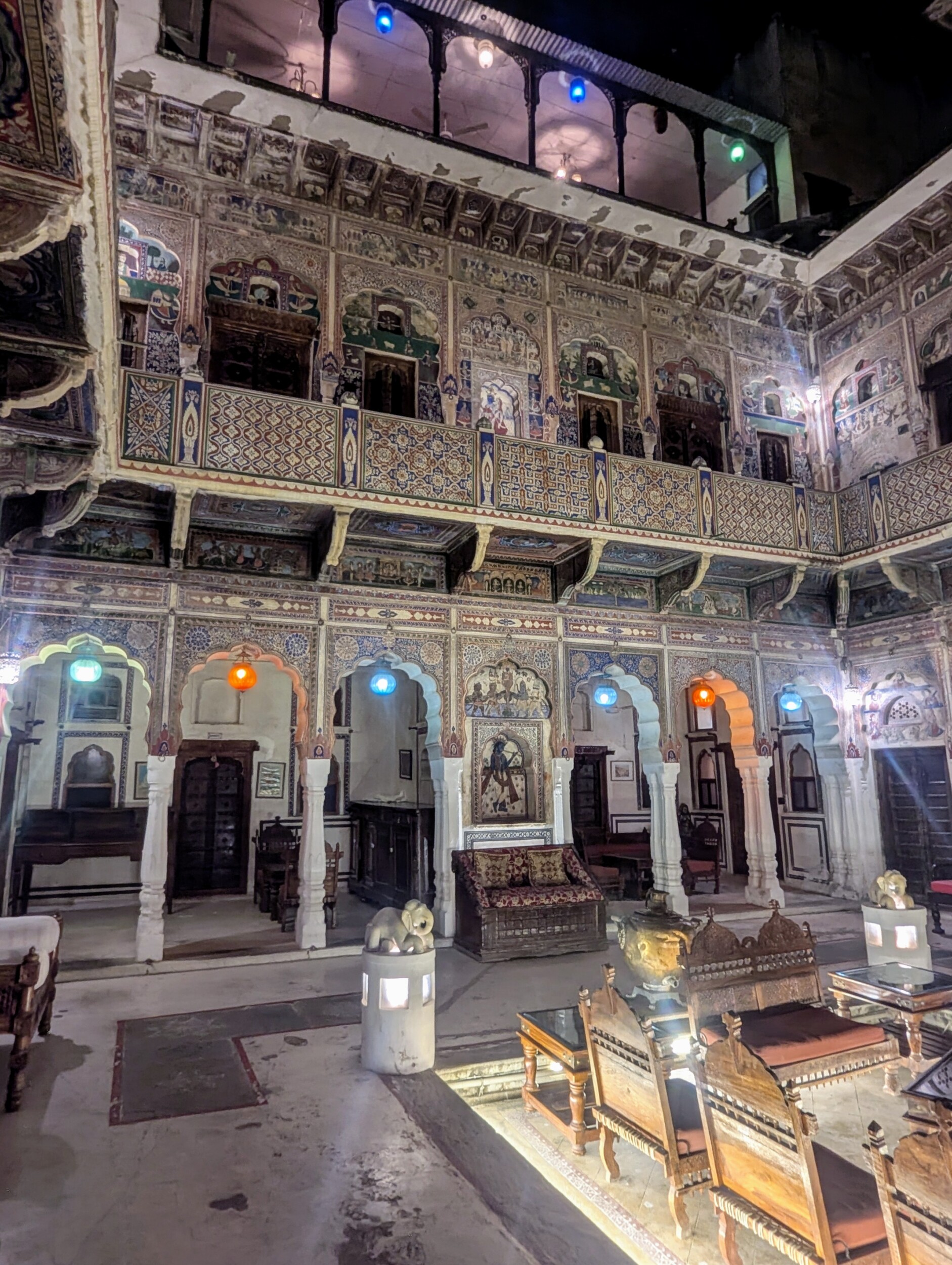
Want a swimming pool at your hotel? Then choose this beautiful haveli Mandawa Kothi. This hotel also offers free bicycles to use – how fun is it to be able to cycle through the streets of Mandawa? I would really enjoy that; it immediately enlarges your radius and thus your experience of a city.
Where to Stay in Nawalgarh
A pension run by a local family; I was welcomed by the daughter. Father Rajesh, with whom I had discussed, wasn’t present but did call in the evening. I felt very welcome and found it very nice to stay in a local setting. A bit outside the center and thus simply in a local neighborhood.
In the communal room downstairs, breakfast and dinner were served. Upstairs was more space where you could sit by your room. I had the top floor and could still sit nicely in the sun.
Want direct contact with Tourist Pension? Call or app Rajesh +91 9414081060
If the pension hadn’t been recommended to me by a friend, I would have booked this eco lodge. Also a homestay just outside the center. This lodge is set up a bit more spaciously since it really has a garden, which is of course super nice!
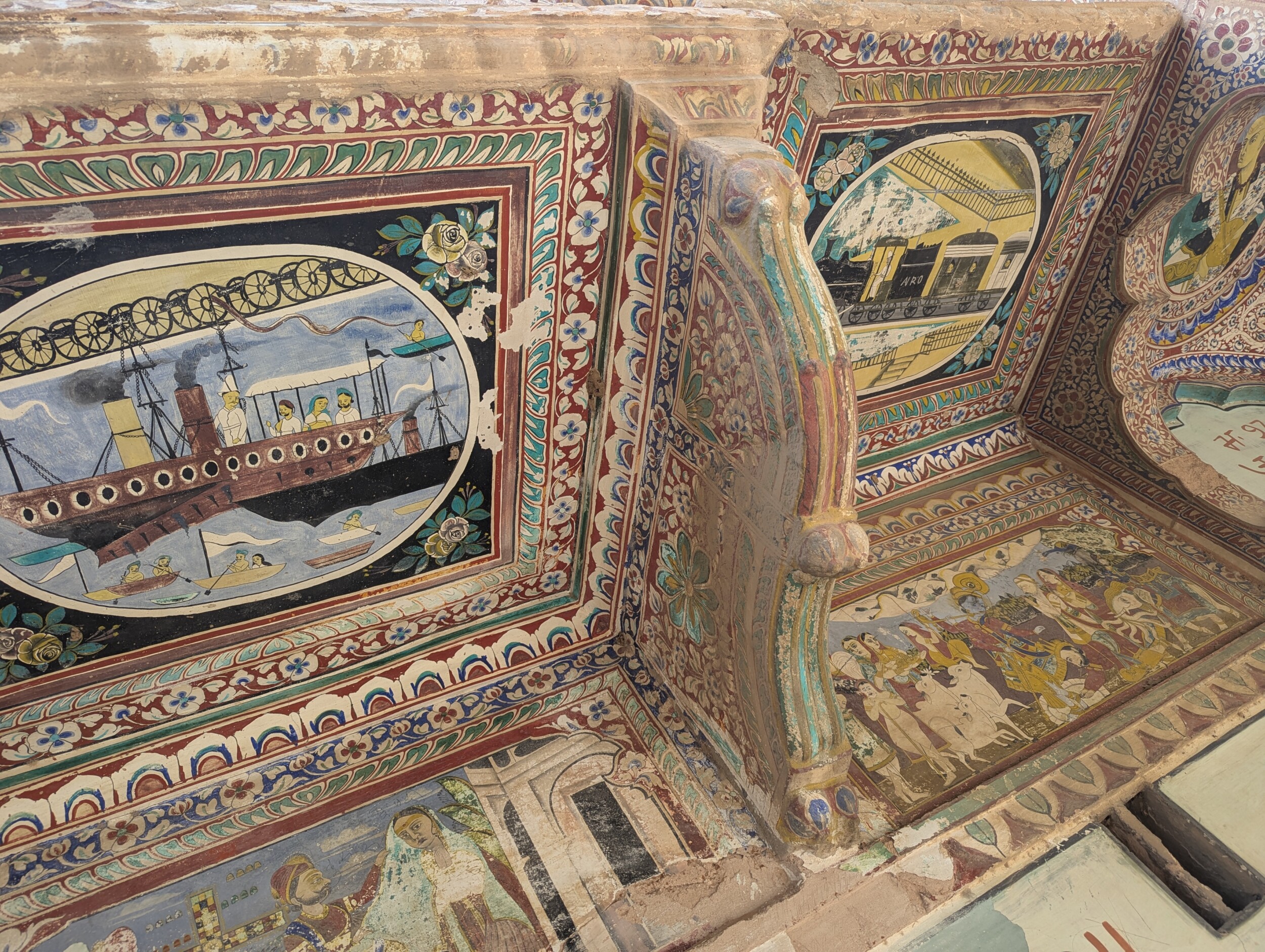
Getting to and from the Shekhawati Region
You can of course travel in India with your own transportation, but for a small extra amount, you have a private driver included. I’ve traveled around Rajasthan this way several times, years ago. If you’re looking for a private driver, I have a recommendation for you – email me or leave a comment, and I’ll get in touch with you.
Local Bus Rajasthan
The bus is easy to arrange, and between the many places in Rajasthan, there are many running. You have the more luxurious bus and the regular local transport. For a short ride, I can recommend taking a local bus. It’s an experience in itself. If you travel for more hours, it’s a bit more comfortable if you know you have your own seat available.
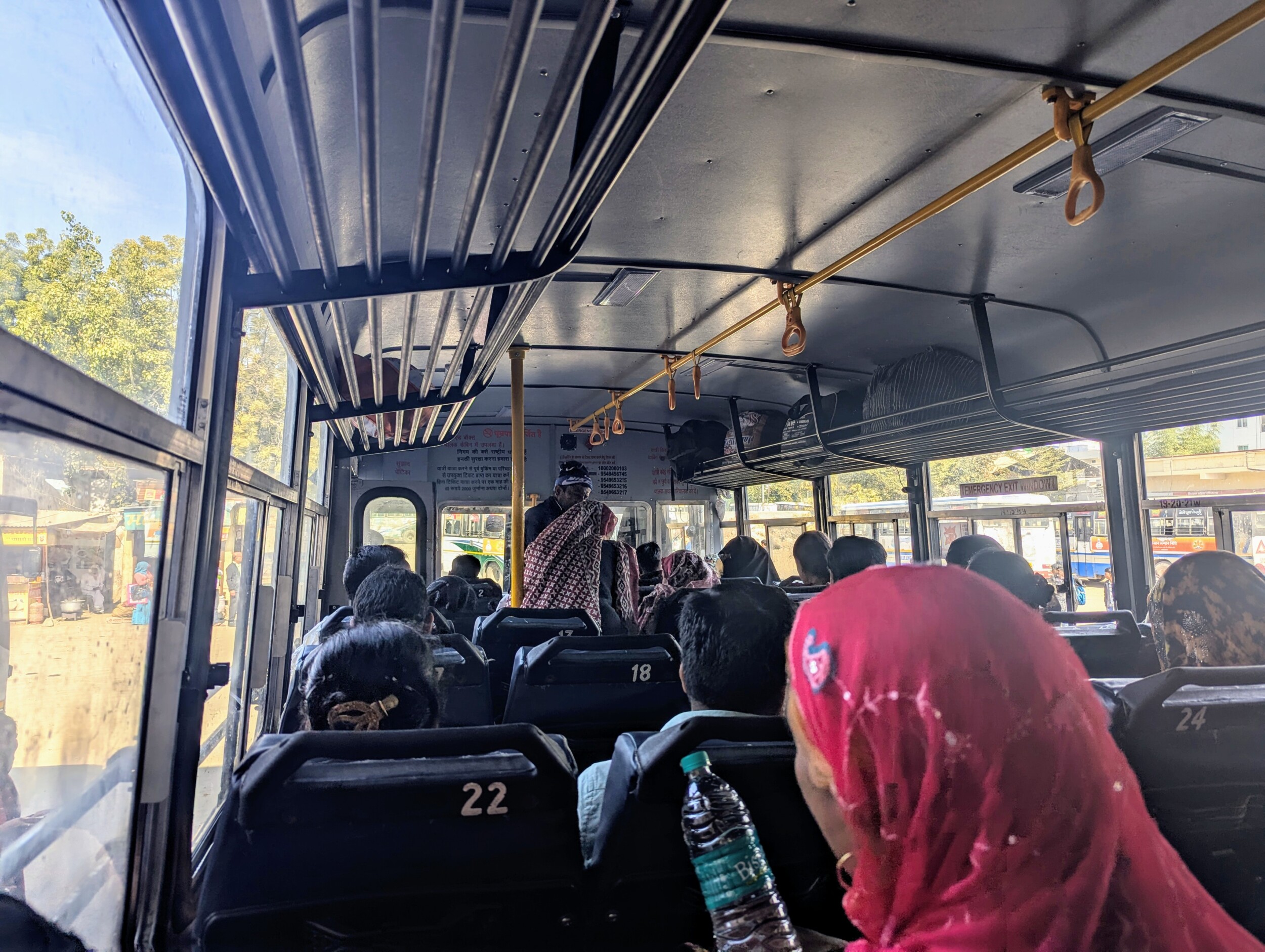
For your reference: The following buses I took during my trip in Feb ’25 in the Shekhawati region, Rajasthan.
- For the bus to Mandawa from Delhi, I paid 285 INR. Full local bus. The journey took about 5 hours.
- For the bus to Nawalgarh from Mandawa, I paid 30 INR, about an hour.
- For the bus to Jaipur from Nawalgarh, AC luxury Volvo bus, I paid 160 INR. The journey took about 3.5 hours.
Flying to Shekhawati
Coming from farther away and flying toward the Shekhawati region? Then you fly to New Delhi or Jaipur. From there, you continue by taxi or bus to Nawalgarh or Mandawa or another place of your choice.
